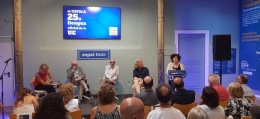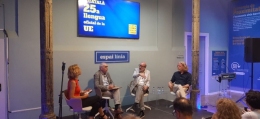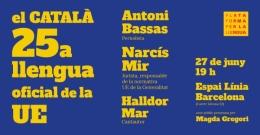Plataforma per la Llengua has set out its demand for official status for Catalan in the European Union this Tuesday, 27 June, at an event in Barcelona bringing together the journalist Antoni Bassas, the jurist Narcís Mir and the singer-songwriter Halldor Mar. All three put forward arguments about the effects of Catalan not being official and the importance of putting pressure on Spain to make a request for Catalan to be the 25th official language of the European Union, now that it is taking on the rotating presidency of the EU institution. From 1 July, Spain will preside over the body that decides the official languages of the European Union by regulation allowing it to put issues on the agenda and negotiate with other States.
The event, entitled Catalan, the 25th official EU language packed the Espai Línia in Barcelona's Eixample to capacity. Led by the journalist Magda Gregori, it began with the showing of a video that explains the situation of Catalan with respect to other languages that are official in the European Union, despite the fact that they have far fewer speakers, as well as some of the consequences suffered by Catalan speakers of their language not being official in European institutions.
The vice-president of Plataforma per la Llengua, Mireia Plana, began the speeches, recalling the strong support for the manifesto that can be read at www.oficialitatara.cat, signed by more than 50,000 people and backed by more than 70 organisations. "What we are demanding is not a chimera: only one regulation of the Council of the European Union needs to be reformed - and it has already been reformed as many as seven times," said Plana. As set out by the vice-president of the Catalan NGO, official status "has real consequences for the use of Catalan; for example, in the field of food labelling".
In this respect, Plana remarked that "there are nine meetings under the presidency of the Council from next Saturday, when it begins, until 23 July, which are nine opportunities to request the reform of the Regulations of the Council that establish the official languages". The demand for official status for Catalan in the European Union is one of the main points raised by Plataforma per la Llengua with the parties competing in the elections to the Spanish Parliament on 23 July, as stated on the website www.votaperlallengua.cat.
Meanwhile, Antoni Bassas said that "the fact that we are still talking about this issue now, in 2023, is a great symbolic blow against us: Catalan speakers". The journalist also wanted to point out that "the fact that it is not possible to speak in Catalan in the Spanish Parliament doesn't help to explain to Europe that it should be possible to do it there too".
The jurist Narcís Mir explained that "from a legal point of view, the routes are clear. They essentially involve amending the Union regulations that establish the official working languages of its institutions". In this respect, he added that "the objections put forward by Spain for not giving an answer, such as the need for a prior reform of the treaties, are highly questionable from a legal point of view".
Finally, Halldor Mar focused on the position of the Icelandic language in the European Union, considering himself "privileged". The singer-songwriter explained that, for example, it is possible to make a Europass in Icelandic. "The OLS, where you can find resources to learn Icelandic, is also funded by the EU. Catalan isn't there, though," Mar stressed. He also recalled that Iceland's Minister of Culture wrote a letter to Disney+ to be able to have content dubbed and/or subtitled in Icelandic: "And they took notice of him!" For Mar, "It's clear that the main reason for this is that the language has a State behind it, and we have always taken a great interest in protecting our language. We also have the threat of English, which increasingly invades our culture."






